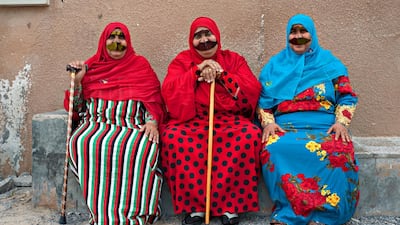When I was 13, my mother and I moved to a city of superheroes. Ras Al Khaimah was home to women who scaled craggy mountains barefoot in search of the perfect honeycomb, men who survived lightning strikes and shipwrecks, and sailors who rescued divers from aquatic djinn by waving garlic over their faces.
I did not appreciate this as a child. Through the eyes of a 13-year-old from Canada’s rainforest west coast, Ras Al Khaimah was ramshackle and dusty.
The mountains had no trees. The sky had no clouds. I told myself I would stay for only two years, three at most. That was in 1997. I am still here.
In 2014, with Jeff Topping, an American photojournalist and former staff photographer for The National, I began a project called People of Ras Al Khaimah.
Jeff and I compiled portraits and interviews with more than 50 people from Ras Al Khaimah – Emiratis and long-term residents who had witnessed the country's transition from a pre-oil economy. We interviewed people from hamlets and the city, encompassing Ras Al Khaimah's four distinct geographies: sea, desert, mountain and cityscape.
Thanks to the support of the Ras Al Khaimah Government and the Sheikh Saud bin Saqr Al Qasimi Foundation for Policy Research, our book will be launched on Thursday in Ras Al Khaimah. We can now share these stories about fearless honeycomb collectors and shipwrecked sailors with a wider audience.
Ras Al Khaimah can be an inaccessible city. It has no downtown core and no obvious walkways. Many people do not speak English. We hope that our book encourages visitors to leave beachside hotels, and helps residents to reconnect with their neighbourhoods.
Many of those we interviewed have aged. Others have repatriated after decades in the Gulf. About half of the profiles are Emiratis, and the other half represent 16 nationalities.
Jeff was insistent that a high proportion of the profiles should be women. For the first month, nearly everyone said it would be impossible to find a single woman who would agree to be photographed. This changed with the three women on the book's front cover, Aisha Saeed Hassan, Fatima Saeed Rashed and Maryam Zaidi Ali. Jeff met them by chance on a street in northern coastal town Al Jeer. As is typical for Al Jeer, they were gracious and welcoming. Once they agreed, others followed.
In Al Jeer, neighbours would appear from homes to give us fresh goats’ cheese and dates as we worked. That hospitality is why many people remain in Ras Al Khaimah, not for years, but for generations.
In the UAE, we are taught to think of ourselves as temporary. Immigration is unofficial, so there is always an expectation from ourselves, or from family, that we will eventually move on. This project taught me to think of myself as permanent.
I learnt how common my own story was. Nearly everyone spoke of the emptiness of the landscape when they arrived, whether it was in 1966 or 1994. People not only cried from the pain of separation from loved ones, but also at the sheer emptiness of the place. Nearly everyone intended to stay for two years – or three at most. Then they found home.
We were welcomed. Our book is not only the story of migrant workers, who are scarcely migratory at all, but also the Emiratis who welcomed them and, very often, were migrants themselves before the discovery of oil.
The first questions I am usually asked in Ras Al Khaimah are not about my nationality or work, but about my family and neighbourhood.
People seek clues to the question: how are we connected? People in Ras Al Khaimah always seek commonalities, and this, perhaps, is why the emirate of 354,000 is still often described as “simple” and like a “village”.
Modernity has arrived and life is more isolated than it was. Public schools now segregate Emiratis and foreigners.
The city has shifted south into suburbs that are more divided by class and nationality. This is how modernity plays out anywhere in the world.
The German philosopher Walter Benjamin said: "The delight of the city dweller is love not at first sight, but at last sight." Some people outgrow their hometown. Ras Al Khaimah flipped this formula and outgrew us. This sentiment will be familiar to many raised in swift-changing Gulf cities, where love is always at last sight.
People of Ras Al Khaimah will be launched on Thursday, June 7 at the Cultural Centre in Ras Al Khaimah, opposite Manar Mall, from 8pm. Entry is free. The book will be on sale from souq.com, www.amazon.co.uk and at bookshops across the UAE. For more stories, For more stories, visit www.facebook.com/rakpeople
_____________________
Read more:
How Latif Al Ani captured Iraq's golden era through a lens
Two artists investigations into public entertainment is subject of Sharjah exhibition
Ibrahim Nasrallah on his life, work and philosophy
_____________________

